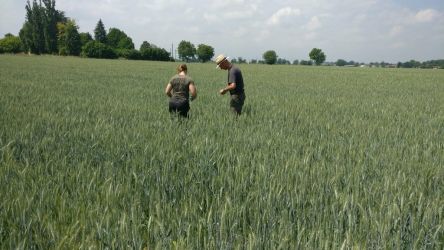The European Diverfarming project tries out crop diversification in five experimental lands in Italy
Those people who are dedicated to agriculture in Italy have to face increasing environmental problems such as the low concentrations of organic material in their soils or the erosion and compacting of said soils. Added to this they must deal with land and water contamination. Seeking to find solutions to this situation, the Council for Agricultural Research and Analysis of the Agrarian Economy (CREA) and the Univeristy of Tuscia together with farmers and experts in the agri-food chain such as Barilla and the Consorcio Casalasco del Tomate will assess the diversification systems introduced in two zones with different climate conditions: the Po valley (north) and the region of Apulia (south), over a period of three years.
 Both trials are part of the European Commission’s Horizon H2020 programme and specifically of the Diverfarming project developed by scientific institutions, companies and farming organisations from eight countries. Its objective is to put into practice a farming system that is capable of sustaining human food and facing up to all of these problems, whilst improving the biodiversity, mitigating the effects of climate change and stimulating the economic sector of the rural zones.
Both trials are part of the European Commission’s Horizon H2020 programme and specifically of the Diverfarming project developed by scientific institutions, companies and farming organisations from eight countries. Its objective is to put into practice a farming system that is capable of sustaining human food and facing up to all of these problems, whilst improving the biodiversity, mitigating the effects of climate change and stimulating the economic sector of the rural zones.
The diversification of Italian fields will be carried out through the rotation of legumes – durum wheat –tomato, which are particularly representative species in Italian foods. The introduction of legumes such as broad beans or peas will help natural nitrogen fixation in the soil, which serves as a nutrient for the rest of the crops, as well as reducing the incidence of diseases and pests.
To manage these crops, use will be made of organic fertilisers (biodigester) instead of mineral-based ones, and the tilling and irrigation will be reduced. The staff of the Consorcio Casalasco and of Barilla, under the supervision of the research team, have been responsible for cropping the peas, broad beans and wheat that will serve as samples for the research team to assess the quality of the crops and their nutritional value after having applied crop rotations and management techniques.
By means of opting for a diversified cropping system, which is the autonomous ecosystem in which several crops cohabitate in the same space, the environmental impact is reduced thanks to the combination of crops that favour carbon sequestration and reduce the emission of greenhouse gases. Furthermore, making teams of plants that work in symbiosis or using plants that return nutrients to the soils will reduce the erosion, but will also reduce the costs for fertilisers and manures, thus providing economic stability to the sector.
To establish more efficient crop combinations, surveys were conducted in Italy among agricultural communities, agricultural associations and technical personnel from the sector. The data extracted regarding crop combinations and management practices of low inputs have enabled four newly-created case studies to be put into practice, as well as one that already existed but in which the management practices have been changed.
Diverfarming is a project financed by the European Commission’s Horizon 2020 Programme, within the challenge of “Food Security, Sustainable Agriculture and Forestry, Marine, Maritime and Inland Water Research and the Bioeconomy”, which counts on the participation of the Universities of Cartagena and Córdoba (Spain), Tuscia (Italy), Exeter and Portsmouth (United Kingdom), Wageningen (Netherlands), Trier (Germany), Pècs (Hungary) and ETH Zurich (Switzerland), the research centres Consiglio per la ricerca in agricoltura e l'analisi dell'economia agraria (Italy), the Consejo Superior de Investigaciones Científicas (Spain) and the Natural Resources Institute LUKE (Finland), the agrarian organisation ASAJA, and the companies Casalasco and Barilla (Italy), Arento, Disfrimur logística and Industria David (Spain), Nieuw Bromo Van Tilburg and Ekoboerdeij de Lingehof (Netherlands), Weingut Dr. Frey (Germany), Nedel-Market KFT and Gere (Hungary) and Paavolan Kotijuustola and Polven Juustola (Finland).










